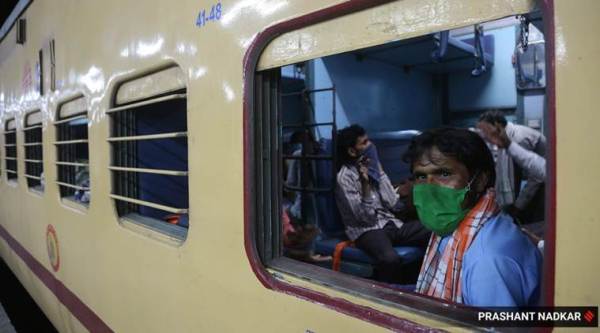 An estimated 12 lakh migrant workers hailing from UP, Jharkhand, Uttarakhand, Bihar, Odisha, and Madhya Pradesh had left Surat during lockdown in 440 Shramik Special trains and private buses. (Representational)
An estimated 12 lakh migrant workers hailing from UP, Jharkhand, Uttarakhand, Bihar, Odisha, and Madhya Pradesh had left Surat during lockdown in 440 Shramik Special trains and private buses. (Representational)
The Bombay High Court Wednesday directed the Maharashtra government to file an affidavit giving details on steps taken to ensure that stranded migrant workers have safe access to their native states. It also sought details about the number of special trains and buses run, the number of migrant workers who boarded them, and the cost and losses incurred by the state government in these arrangements.
The directions were issued after Advocate General Ashutosh Kumbhakoni for the state government informed the court that there was a reverse migration of workers in Mumbai and other cities and, therefore, demand to arrange transport for migrant workers was an exercise in futility. He added that the state had incurred losses as workers did not show up to board the trains.
The High Court sought to know from petitioners and authorities if the other states were willing to receive migrant workers and once the clarity arrived on the same and the number of migrant workers wishing to leave for home states is identified, the Centre can take instructions from railways to provide trains.
A Division Bench of Chief Justice Dipankar Datta and Justice A S Gadkari was hearing through videoconference, a PIL by the Centre of Indian Trade Unions (CITU), filed through senior counsel Gayatri Singh and advocates Kranti L C and Ronita Bhattacharya Bector, seeking relief for migrants availing special Shramik trains and buses to reach their native states during the Covid-19 pandemic.
Last month, the HC had refused to dispose of the PIL and did not grant any immediate relief to stranded migrant workers awaiting Supreme Court order on the same.
On Wednesday, the petitioner informed the court that there were over 13000 stranded migrant workers in Maharashtra willing to return to their native places in Jharkhand, Uttar Pradesh, Manipur, Bihar, West Bengal and other states, and that the state government was required to arrange transportation facilities for them.
However, Kumbhakoni strongly opposed the plea and said that sufficient provisions were made by the state and since there was a reverse migration of workers in Maharashtra, the petitioner’s claim was unfounded.
Kumbhakoni submitted requests were made by petitioner and other NGOs with a list of nearly 8,520 migrant workers willing to leave for their native places and about six trains were arranged for them and Railways were paid nearly Rs 69 lakh for the same. However, nearly 3,551, less than half the number of workers turned up and boarded the trains, as a result of which the state suffered a loss of Rs. 42.22 lakh, the state submitted.
He cited an instance in Pune wherein arrangements for nearly 283 migrant workers were sought and only 49 workers turned up, adding they were taken in two buses to the Railway station and boarded a train with over 20 bogies. “Trains had to be run as our head is under the sword of contempt of previous court orders,” Kumbhakoni said.
He said that relief camps started for providing shelter along with essential and medical facilities to stranded workers were closed as most workers have been sent back to their native places.
After hearing the submissions, the bench observed that as some states were refusing to allow workers to return, authorities were required to ascertain if the receiving states were inclined to take back migrant workers.
Moreover, it said that petitioner and other NGOs should provide the details to the state government on the number of migrant workers and the states they belong to, after which the states concerned can be contacted by the authorities on their willingness to receive migrant workers.
The HC asked the state government and Additional Solicitor General Anil Singh representing Railways to collate and process information and publicise the decision.
The HC also directed the state government to file detailed affidavit enumerating challenges it had raised to the petition within seven days and directed the petitioner to file a rejoinder thereafter and posted the case for further hearing after two weeks.